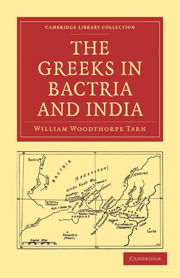Book contents
- Frontmatter
- Contents
- Prefaces
- Abbreviations
- Introduction
- PART I (INTRODUCTORY): THE BACKGROUND IN THE MIDDLE EAST
- PART II BACTRIA AND INDIA
- CONCLUSION
- Excursus. The Milindapañha and Pseudo-Aristeas
- Appendix 1 Monograms and find-spots
- Appendix 2 The names in -ηνη
- Appendix 3 Agathocles' pedigree coins
- Appendix 4 The Yuga-purāna of the Gārgī Samhitā
- Appendix 5 Demetrius in the Hāthigumphā inscription of Khāravela
- Appendix 6 Alexandria of the Caucasus and Kapisa
- Appendix 7 Antiochus IV and the temple of Nanaia
- Appendix 8 A sealing from Seleuceia
- Appendix 9 Ki-pin (Kophen) and ‘Arachosia’
- Appendix 10 Ta-yuan
- Appendix 11 Chorasmia
- Appendix 12 Ormuz: a lost kingdom
- Appendix 13 Σάγαλα ἡ καὶ Εὐθυμέδεια
- Appendix 14 The supposed Oxo-Caspian trade route
- Appendix 15 The Oxus question to-day
- Appendix 16 The Era of the Moga copperplate from Taxila
- Appendix 17 The Hermaeus-Kujula Kadphises coins
- Appendix 18 San and Rho
- Appendix 19 Pāndava-Pāndu and Pāndhya
- Appendix 20 The Chinese sources
- Appendix 21 The Greek names of the Tochari
- Addenda
- Addenda (1950) to the Second Edition
- General Index
- Index of Principal Greek and Latin Passages
- Plate section
Excursus. The Milindapañha and Pseudo-Aristeas
Published online by Cambridge University Press: 10 November 2010
- Frontmatter
- Contents
- Prefaces
- Abbreviations
- Introduction
- PART I (INTRODUCTORY): THE BACKGROUND IN THE MIDDLE EAST
- PART II BACTRIA AND INDIA
- CONCLUSION
- Excursus. The Milindapañha and Pseudo-Aristeas
- Appendix 1 Monograms and find-spots
- Appendix 2 The names in -ηνη
- Appendix 3 Agathocles' pedigree coins
- Appendix 4 The Yuga-purāna of the Gārgī Samhitā
- Appendix 5 Demetrius in the Hāthigumphā inscription of Khāravela
- Appendix 6 Alexandria of the Caucasus and Kapisa
- Appendix 7 Antiochus IV and the temple of Nanaia
- Appendix 8 A sealing from Seleuceia
- Appendix 9 Ki-pin (Kophen) and ‘Arachosia’
- Appendix 10 Ta-yuan
- Appendix 11 Chorasmia
- Appendix 12 Ormuz: a lost kingdom
- Appendix 13 Σάγαλα ἡ καὶ Εὐθυμέδεια
- Appendix 14 The supposed Oxo-Caspian trade route
- Appendix 15 The Oxus question to-day
- Appendix 16 The Era of the Moga copperplate from Taxila
- Appendix 17 The Hermaeus-Kujula Kadphises coins
- Appendix 18 San and Rho
- Appendix 19 Pāndava-Pāndu and Pāndhya
- Appendix 20 The Chinese sources
- Appendix 21 The Greek names of the Tochari
- Addenda
- Addenda (1950) to the Second Edition
- General Index
- Index of Principal Greek and Latin Passages
- Plate section
Summary
The Milindapañha or Questions of Milinda is the one extant work professedly dealing with any of the Greek monarchs in the Far East; for Milinda, beyond any question, is the king Menander. It exists in a Pali version and, in part, in a Chinese translation of the fourth century A.D. of which two recensions are extant. The Pali work falls into two well-marked divisions; the first comprises pp. 1–89 in Trenckner's edition of the Pali text, being books I–III inclusive; the second and longer part comprises all that follows. It is now generally agreed that Part II is later than Part I and the work of a different hand, and it is also generally agreed that Part I (or perhaps I should say the original of Part I) cannot be placed too long after Menander's death; but I need not quote the datings suggested, for none of those who have professedly dealt with the work have investigated Menander's chronology and have usually put him near the end of the second century b.c. or even in the first century. The Chinese translation includes Part I and a few pages of Part II.
The work is cast in the form of a dialogue between Menander and a Buddhist sage Nāgasena, with an introduction in which Menander, at his capital Sāgala, appears as a great king fond of learned disputations, together with his 500 Yonakas, four of whom play a part in setting the scene for the dialogue proper. In the first part Menander's professed object is not the pursuit of knowledge but a dialectical victory over Nāgasena, though he does not in fact keep his end up very well.
- Type
- Chapter
- Information
- The Greeks in Bactria and India , pp. 414 - 436Publisher: Cambridge University PressPrint publication year: 2010First published in: 1938



